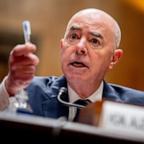Best and worst draft marriages
— -- It's that time of year again, the moment when we take a long look at what transpired during the NFL draft and make some bold predictions. We call it the best and worst draft marriages of the coming season, the unions that should the most exciting to watch and also the most frustrating.
As usual, it's important to clarify that this isn't a projection of how these players will fare over the course of their pro careers. It's only an attempt to gauge what kind of impact they'll have this fall.
With that said, here are the five players who will make huge contributions this coming season and five others who will struggle to live up to the hype:
Best
1. Aaron Donald, DT, St. Louis: Donald becomes the fourth defensive lineman the Rams have selected in the first round since 2008. He also will help make this unit as formidable as any front four in football. St. Louis already has a Pro Bowl defensive end in Robert Quinn (who finished 2013 with 19 sacks), while fellow end Chris Long and defensive tackle Michael Brockers have both developed into solid players. Add Donald to that mix, a player who can be disruptive against both the run and the pass, and the Rams defense suddenly has the potential to go to another level.
St. Louis general manager Les Snead and head coach Jeff Fisher obviously understand that keeping pace in the hyper-competitive NFC West -- where Seattle won the Super Bowl, San Francisco reached the NFC Championship Game and Arizona won 10 games -- involves shrewd personnel decisions. By taking Donald with the 13th overall pick, they landed a major talent who can plug in and play from day one ... and potentially dominate.
2. Justin Gilbert, CB, Cleveland: Given the news that Pro Bowl wide receiver Josh Gordon is facing a one-year suspension for violating the NFL's substance abuse policy, the Browns need something to look forward to this fall. Gilbert's addition to a quickly improving defense will be one of those options. The first-round pick has his flaws -- despite being 6-feet and 202 pounds, nobody is lauding him for his run defense -- but he's the perfect fit for a unit that already has one Pro Bowl cornerback in Joe Haden.
With Haden on one side and Gilbert on the other, the Browns have two defenders who can thrive in the man coverage, which is essential to the aggressive defensive schemes head coach Mike Pettine favors. Gilbert also gives the Browns a dangerous returner, as he produced six returns for touchdowns in his career at Oklahoma State. If the Browns defense improves immensely this fall, Gilbert's play will have a lot to do with that.
3. Brandin Cooks, WR, New Orleans: The Saints traded up to select Cooks and it's easy to see why: He's exactly the kind of receiver who should flourish in that wide-open offense. Cooks has speed, explosiveness, polished route-running skills and the ability to gain yards after the catch. Even in a league where wide receivers generally struggle to find their way as rookies, his chances of helping the Saints immediately seem strong.
New Orleans doesn't have the same depth at receiver as it has enjoyed in recent years and quarterback Drew Brees needs some new targets with big-play ability. The Saints also have two receivers in their current lineup who were able to contribute early in their first seasons with the franchise ( Marques Colston and Kenny Stills). Don't be surprised if Cooks makes his own transition to the league look just as smooth.
4. C.J. Mosley, ILB, Baltimore: Mosley isn't the second coming of Ray Lewis, but the Ravens will appreciate everything he can do for that defense. His instincts and versatility make him the prototypical three-down linebacker, one who will fit in quickly with a Baltimore defense that lost several key players after winning the Super Bowl two years ago.
Even with those departures, the Ravens still have Haloti Ngata at nose tackle, Terrell Suggs rushing the passer from the outside and some blossoming young players who should understand this team's long-standing history of playing great defense. Ravens general manager Ozzie Newsome also is an Alabama alum, which gives him even more knowledge of what he's getting in Mosley. If you're looking for an early leader for Defensive Rookie of the Year, this is the guy.
5. Jordan Matthews, WR, Philadelphia: The Eagles snagged one of the steals of the draft by landing Matthews in the second round. The former Vanderbilt product has first-round talent and he's got the smarts and talent to help Chip Kelly's fast-paced offense immediately.
The Eagles dumped Pro Bowl wide receiver DeSean Jackson earlier this offseason. They'll also miss underrated possession receiver Jason Avant (now in Carolina), while Jeremy Maclin, the man who becomes the top target in this system, is returning from a torn ACL.
Those factors alone should equate to plenty of opportunities for Matthews. Kelly found a way to turn wide receiver Riley Cooper into a productive player after only one year in this system. Imagine what Matthews -- who has more talent and upside -- can do in his first season with the Eagles. He's not going to make people forget the speedy Jackson, but he's definitely going to help Philadelphia's cause.
Worst
1. Dee Ford, OLB, Kansas City: This really doesn't have anything to do with Ford as a player. By all accounts, he's a gifted pass-rusher who someday might live up to the first-round pick the Chiefs used on him Thursday night. It has everything to do with the Chiefs' needs this coming season and where exactly he fits into that picture. Kansas City simply isn't good enough to take a player whose real value will come after next season, when Pro Bowl outside linebacker Tamba Hali might be too old and expensive to keep on the roster.
This year, Hali and fellow Pro Bowler Justin Houston will continue to be the starting outside 'backers in a defense that won't need nearly as many reps from Ford in his rookie season. Granted, the Chiefs' pass rush did suffer when both Hali and Houston sustained injuries during the second half of last season. But that still means Ford's greatest value is as a backup who could provide more depth than instant impact.
He may be a star down the road -- and remember, he still has to prove he can move from defensive end to outside linebacker -- but the Chiefs likely won't reap any real impact from him until 2015 at the earliest.
2. Dominique Easley, DT, New England: It would be easier to be excited about Easley if there weren't so many red flags in his medical history. His career at Florida included two torn anterior cruciate ligaments (one in each knee), and that's not the most encouraging news for a team that lost two defensive tackles to injuries last season ( Vince Wilfork and Tommy Kelly).
Easley certainly had enough head-turning ability to be a first-round pick; his quickness and his motor create a devastating combination for opposing blockers when he's healthy. The Patriots also might feel as though they can find a star in Easley in the same way they did with tight end Rob Gronkowski in the 2010 draft. Health concerns led to Gronkowski dropping into the second round and he became a Pro Bowler two years later.
That said, injuries also have limited Gronkowski to only 18 games over the past two seasons. The odds of Easley avoiding such problems don't look good from here.
3. Ja'Wuan James, OT, Miami: The Dolphins clearly were desperate to address their offensive problems because James, by all accounts, was a reach. Most draft analysts projected him as a second-round pick, so he'll already have a hard time living up to his stature as the 19th overall selection.
That isn't to say he doesn't have upside. At 6-6 and 311 pounds, he has the length and quickness to be a dependable right tackle at the next level. However, his detractors also question his tenacity and consistency, both of which suggest he's going to need time to find a comfort zone with an offensive line that has only one returning starter in center Mike Pouncey.
4. Kelvin Benjamin, WR, Carolina: Benjamin wouldn't be on this list if the Panthers still had Steve Smith. Because they don't -- and they also lost their top four receivers from last season -- it's impossible to imagine Benjamin tearing up the league in Year 1. Sure, he has great size (6-5, 240 pounds) and impressive athleticism. But he also possesses average speed and may have a tough time adjusting to press coverage from NFL cornerbacks after bullying smaller defenders in college.
At least Carolina has one veteran receiver, free-agent acquisition Jason Avant, to mentor Benjamin when necessary. But with no other proven targets on the roster, Benjamin is about to learn how hard it is to succeed in the NFL when you're learning on the fly.
5. Eric Ebron, TE, Detroit: Ebron is a special talent, of that there is no doubt. He's got size, speed and the ability to split out wide and create mismatches against smaller defensive backs. The problem here is simple math: How many receivers does the Lions' offense really need?
Ebron joins an offense that already has the best wide receiver in football ( Calvin Johnson), a newly acquired free-agent wideout ( Golden Tate) and two other tight ends who have been popular targets for quarterback Matthew Stafford ( Brandon Pettigrew and Joseph Fauria). Add in the fact that running back Reggie Bush is a big part of the passing game -- he caught 54 balls in 2013 -- and you have to wonder how much impact Ebron can make in his rookie season. Ebron may be a future star, but expectations will have to be tempered in Year 1.




